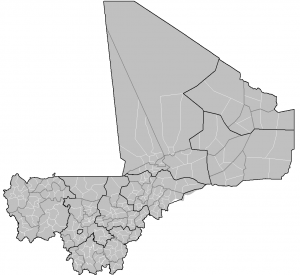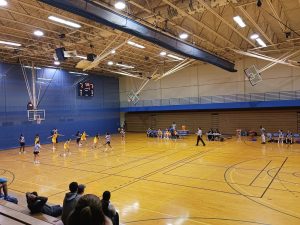As Mali Conflict Continues, Chicago Malians React
February 21, 2013

Despite an organized rebellion, a military coup and a foreign intervention on behalf of France happening all in less than a year, Mali has managed to stay in the margins of the American media. For such a major international incident, it has gone largely unreported. Whether it is because of the sheer complexity of the situation, or because of a state instituted reporting blackout, the conflict in Mali has been mostly invisible. For many Malians living in their homeland and abroad, this is precisely the problem.
Much like all African nations carved out of European colonialism, Mali is divided on a multitude of ethnic, religious and tribal levels. Since its decolonization by the French in 1960, Mali has seen several rebellions by the Tuareg people in the Northern part of the country. Less than a year ago in February, the National Movement for the Liberation of Azawad ( MNLA), a secular Tuareg group intent on establishing an independent democracy, rebelled. Stratfor, a global intelligence company based in Austin, Texas, reported that many of the Tuaregs who returned to Mali had previously served in Gaddafi’s army and were supplied with weapons and equipment pouring out from Gaddafi’s abandoned military bases and armories. The MNLA was joined by Ansar Dine, an Islamist group who favored a system of Sharia law.
In March, the Malian military overthrew the democratically elected government in the capital of Bamako. The New York Times reported the arrest of the president and his entire cabinet. The ensuing chaos involving riots, looting and combined international condemnation and non-support from the United States, European Union and African Union worked to the advantage of the rebels in the North. Coumba Sylla of Middle East Online reported as early as March 4, 2012 that the alliance between these two groups had successfully seized the entire Northern half of the country, occupying major cities such as Kidal, Gao and Timbuktu.
By May, the conflict in ideology between the two main groups in the north had come to a supposed conclusion. The BBC reported that the MNLA and Ansar Dine had agreed upon an Islamic state for Mali. However, a month later the BBC also reported that the Islamists had driven the Tuareg leaders out of Gao. Sharia law was soon put into effect.
With the continued push by Ansar Dine into the South of Mali, the UN passed a measure to allow use of all force necessary to counter the threat. France, who maintains a significant military presence in the region, intervened with air strikes. The use of aerial bombardment alone did nothing to stop the advance of the rebels, said Al Jazeera. Combined ground forces from the French and Malian armies were deployed, and forces from surrounding African nations were also committed by UN request.
The Washington Post reported in mid-January that the French president Francois Hollande declared a unilateral French intervention. It was suggested that, given the speed of the rebel advance, without the French intervention, the Southern capital of Bamako would have been conquered within days. Though it has been successful so far, there are many problems with the intervention.
Hollande was greeted in liberated Timbuktu on Feb. 2 with cheers and praise. What few reports came from the scene suggested that the locals had endured a great deal of abuse at the hands of the occupying Islamists. However, the conditions in the field and in the cities have been extremely limited. Journalists are operating under a strict press blackout mandated by the French. Al Jazeera reports that reporters are limited to logistical lectures, official statements and are prohibited from operating independently in the field and conducting extensive interviews.
On Jan. 31, the French Defense minister Jean-Yves Le Drian called the intervention a success and declared that the conflict was at a “moment of change.” He was quoted in Al Jazeera as suggesting it is time for “the political process to move forward.” One of the great challenges of this new task is for a meaningful dialogue to be established between rebel groups in the North and the illegitimate military dictatorship in the South.
Despite such grand claims of success, little has been done to aid the people who have suffered the most as a result of the conflict. The UN Refugee Agency estimates that some 350,000 people have been displaced to the vast unpopulated areas of Mali, with many traveling to neighboring countries in search of refuge.
The Northwestern Medill reported that the Masjid al-Farooq Mosque, headed by Imam Ousmane Drame, has set up a donation drive to provide some relief for those who are suffering as a result of this conflict. When interviewed, Drame touched on the problem of raising awareness for the cause. According to Drame, Malians are not only few in number in the US, but are unorganized, and suffer from a lack of attention as such.
Drame has been able to raise $50,000 in aid and collect a great deal of material donations. It is a hopeful effort in a tragic situation, and will undoubtedly give some much needed support to people who are in short supply of the care they desperately need. Regardless of the efficacy of the intervention or the incomplete picture of events, the clouds have not yet broken for Mali.
http://news.medill.northwestern.edu/chicago/news.aspx?id=214855
http://www.aljazeera.com/indepth/features/2013/01/2013127154355125483.html
http://www.nytimes.com/2013/02/03/world/africa/france-hollande-timbuktu-mali.html?pagewanted=all
http://www.unhcr.org/pages/4f79a77e6.html
http://www.aljazeera.com/news/africa/2013/01/201313019053271650.html
http://www.aljazeera.com/news/africa/2013/01/2013131143642462396.html
http://www.bbc.co.uk/news/world-africa-18610618
http://www.middle-east-online.com/english/?id=51578
http://www.bbc.co.uk/news/world-africa-18224004
http://www.aljazeera.com/news/africa/2013/01/201311413431010619.html
http://www.stratfor.com/weekly/mali-besieged-fighters-fleeing-libya







